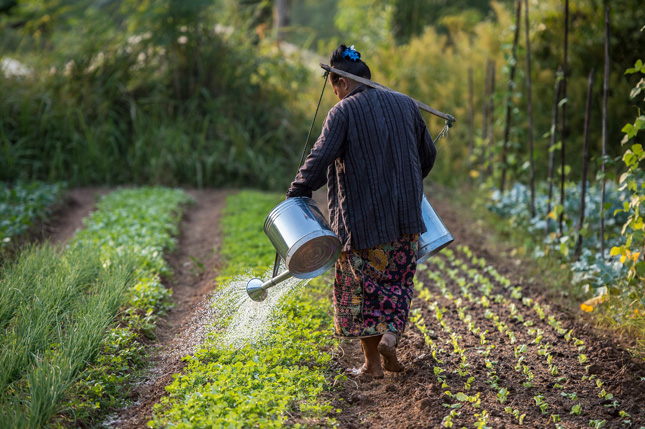-
UN Agency Calls for Global Transformation of Agriculture in the Face of a Changing Climate
November 15, 2016 By Sreya Panuganti
A recent report by the UN Food and Agriculture Organization (FAO) warns that over the next 15 years, climate change will add to the number of people living in poverty via its effects on the agriculture and food sectors. By 2030, climate-related effects on food-related livelihoods could lead to an additional 35 to 122 million impoverished people, according to the 2016 State of Food and Agriculture Report.
The annual report projects the future of farming and food security in the face of a changing climate. It advocates for a broad-based transformation of agricultural systems “to ensure global food security, provide economic and social opportunities for all, protect the ecosystem services on which agriculture depends, and build resilience to climate change.”
While this kind of transformation won’t be easy, the FAO makes policy recommendations and suggests technical and financial mechanisms that will put farmers and governments on the right path.
Agriculture, at the intersection of human activity and natural resources, “holds the key to solving the two greatest challenges facing humanity: eradicating poverty and maintaining the stable climatic corridor in which civilization can thrive,” writes José Graziano da Silva, the FAO director-general.
But “without adaptation to climate change,” the report states, “it will not be possible to achieve food security for all and eradicate hunger, malnutrition, and poverty.”
A Call for Transformation
Climate change threatens all dimensions of food security, impacting agriculture, livelihoods, and infrastructure, the report warns. The urban and rural poor will face higher and more volatile food prices, crop productivity will be reduced, and the livelihoods of millions of rural people will be disrupted.
Agricultural also has a profound effect on climate change, accounting for at least one fifth of total greenhouse gas emissions, primarily from converting forests to farmland and from livestock and crop production. While efforts are being made to reduce greenhouse gases in agriculture, the FAO says the drive to conserve forests directly competes with demand for more food and energy.
“Without adaptation to climate change, it will not be possible to achieve food security”The FAO recommends a pivot to agricultural and development policies that support low-income, smallholder farmers. There are about 475 million families in developing countries operating on small plots of land and relying mainly on family labor, the report says. They face such obstacles as limited access to markets and credit, poor information about weather and climate conditions, and few risk management tools and social protections, like insurance.
Women farmers make up 43 percent of the agricultural labor force in developing countries, and are especially disadvantaged, with less endowments and entitlements than men, more household responsibilities in some cases, and “increasingly heavy agricultural workloads owing to male out-migration,” the report says. Social and cultural norms also prevent some women from pursuing alternate livelihoods.
To better prepare for climate change, the FAO urges more attention to these smallholders, especially women. “What is needed is a reorientation of agricultural and rural development policies that resets incentives and lowers the barriers to the transformation of food and agricultural systems,” write the authors.
Improving smallholder farmers’ access to markets, providing guidance on ways to overcome high transaction costs and more scarce resources, and resolving land tenure questions are all policy objectives that should be elevated.
Farmers in many developing countries have been slow to adopt improved “climate-smart” practices. The report notes this is in part due to policies and subsidies for inputs, like fertilizers, seeds, and machinery, that boost agricultural productivity but “perpetuate unsustainable production practices.” Instead, the report recommends adopting nitrogen-efficient and heat-tolerant crops, more effective soil fertility management, and a reduction in input subsidies to incentivize more sustainable farming. (Editor’s note: See also data on social and cultural barriers to such changes.)
Multiple Benefits
Climate adaptation efforts in agriculture “make good economic sense,” the FAO says. By increasing the efficiency of resources, cutting the use of fossil fuels, and avoiding direct environmental degradation, farmers will save money, enhance productivity, and reduce their dependence on costly external inputs.
The number of people at risk of undernourishment in developing countries in 2050 could be cut by more than 120 million people solely through more widespread adoption of nitrogen-efficient crop varieties, according to the report.
Diversification – of both agriculture and of livelihoods – is another way to build up resilience to climate shocks. The report points out the utility of integrating food production and ecological processes, like the production and decomposition of plant matter. Some “agroforestry” systems use the leaves of nitrogen-fixing trees to feed small herds of cattle. The cattle then produce manure for fertilizer and also supplement diets and incomes when food security is especially dire.
Supporting smallholder farmers is more than just a food and climate issue, but vital to broader development. The report suggests social protection programs, access to education, and functional labor markets for these communities are all pieces to the resilience puzzle.
The international community must act now to address climate change, the FAO says. Encouraging the agricultural, forestry and fisheries sectors to adopt climate-friendly practices will “determine whether humanity succeeds in eradicating hunger and poverty by 2030 and producing food for all.”
Sources: International Food Policy Research Institute, UN Food and Agriculture Organization.
Photo Credit: Organic Vegetable Farmers in Boung Phao Village, Lao, courtesy of the Asian Development Bank.
 A Publication of the Stimson Center.
A Publication of the Stimson Center.



